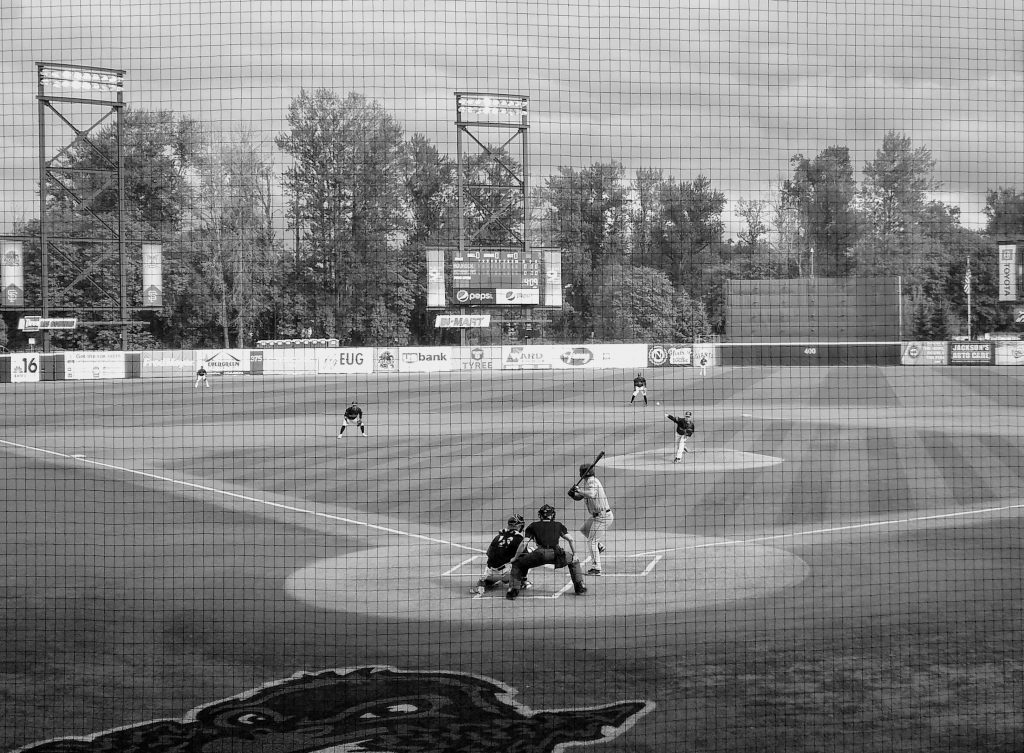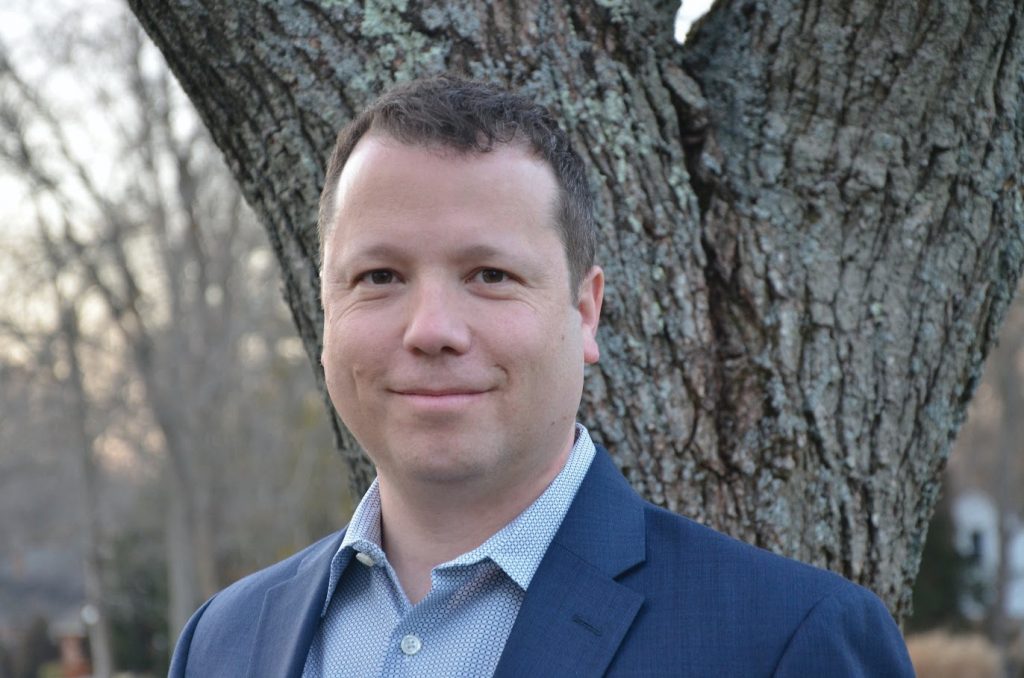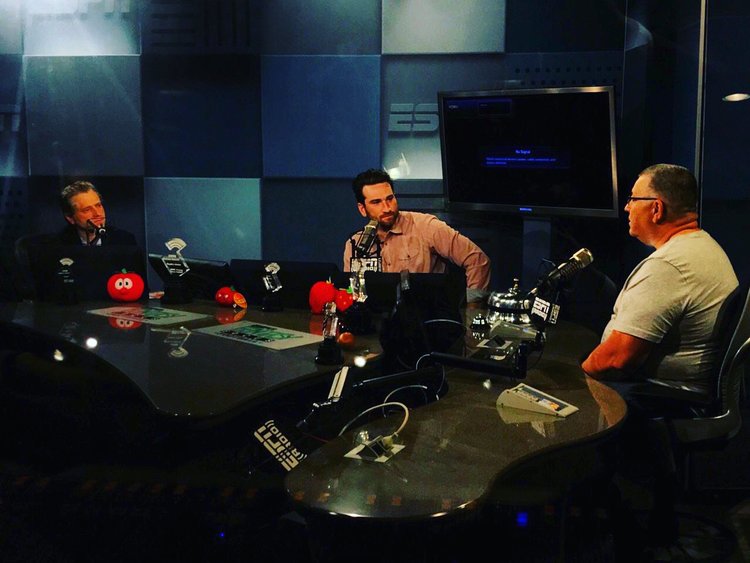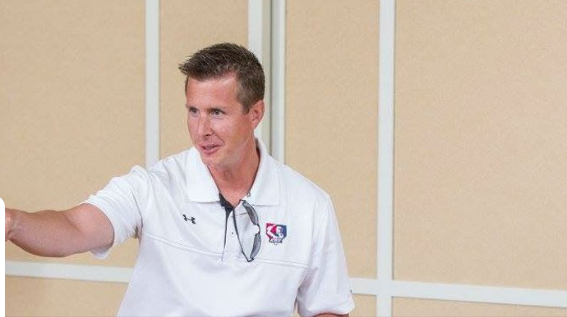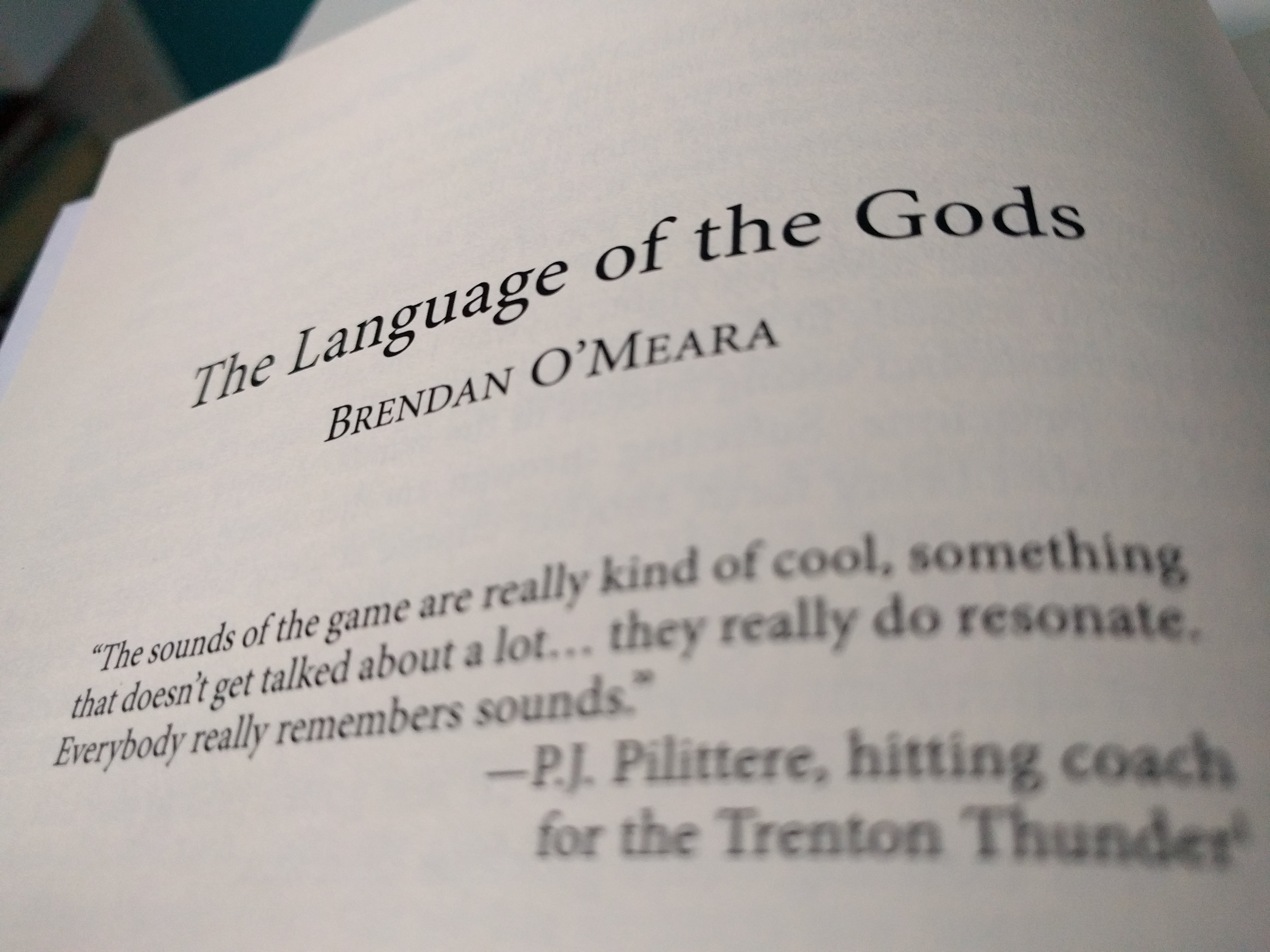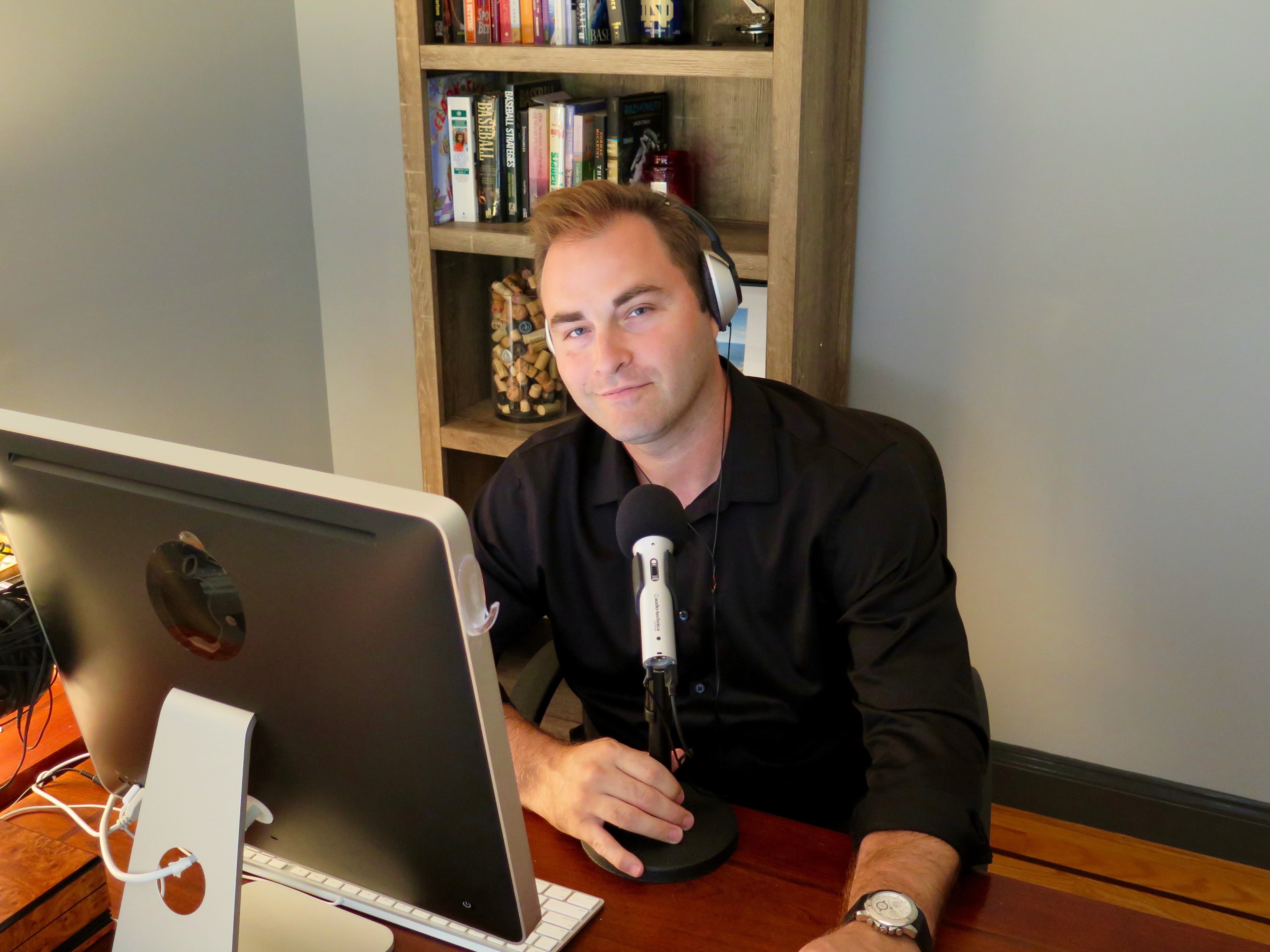Hello,
So, I know my website deals heavily in nonfiction, but what’s the harm in talking about fiction?
I wrote this short story for a sports fiction contest. It lost. It didn’t even earn an honorable mention. As I see it, what’s the use in holding on to these things. I own the printing press to this blog, so why not print out a story? I hope you like it.
The Ringer
By B. Ryan O’Meara
I was a middling baseball player. I was aware of my middlingness and thus saved my money while I was in the pros. I never made much, but it was above average and for a short time you might even say I was wealthy. I mean, I once test-drove a Maserati. My best season saw me play 93 games, bat .271 with 14 RBIs and one home run (an inside the park homerun when the center fielder, the great Ken Griffey, Jr. tried to make one of his typically outstanding plays. Show off.) After my career was effectively over I took a year or two to do nothing more than be a bullpen catcher. I made something like $40,000 a year to watch professional baseball players do their thing, warm up a relief pitcher late in the game, and otherwise reflect on how good I had it.
Then there came a time to give that up. I had my money, yes, but I had no education so I was basically unhireable. I wanted to do something but I didn’t really care what that something actually was. I lived an extraordinary life for a time and now it was time to blend in as best I could. I’d be the red to somebody’s blue and make purple. I could walk into any hardware store, diner, or supermarket and not draw the slightest bit of attention. That was the hope.
I shouldn’t say that I’m completely anonymous. I’m not a vampire; people do know a pro athlete lives among them like some demi god. I get bombarded all the time from people who say, “Man, Zubris, if my coach had gone to bat for me, I could’ve made it.” Or, “This kid I knew threw 90 and I got a hit off of him.” So by extension you can hit in the pros? Every day? I want to tell them that 90 in the pros is not that hard. I smile and nod and say, “What can I say? I got lucky.” But luck had nothing to do with it. Plus, relatively speaking, I wasn’t that good. They don’t hand out awards to bullpen catchers. We warm up the stars and feel lucky we were ever that close to greatness.
I loved playing ball and there were twilight leagues I could join, but that didn’t seem fair. Plus seeing middle-aged men in baseball uniforms stretched over their midsections was depressing or, at least, it depressed me. Strangely, what seemed more age appropriate, like mom jeans, was playing slow-pitch softball.
***
I knew I wanted to join a softball league and I knew people would want my bat for their lineups. I’d be a guaranteed homerun. It could be validating for a guy like me who got a whiff of the Show, but never was much more than an understudy. I realize that puts me in rare company, but all this shit is relative.
I went downtown to buy a hammer (Who doesn’t have a hammer?). I noticed, all over, signs saying “Now Hiring! Inquire Within!” “Help Wanted!” Everything from Bob’s Diner, to the True Value, Stop and Shop, and the local beverage center. I walked into the hardware store. The bell on the door rung and the clerk turned to me and said hello and stared.
“Hello,” I said. She brushed her hair aside and stared at me a beat too long to be unintentional. I’m not even that good looking. Plus I’m married to someone in a far better beauty bracket relative to my own looks. Yes, Marie is fiendishly beautifully, a one percenter.
It looked as if the woman pressed a button below the counter. I walked to the aisle where all the hammers were. There were so many stupid hammers. It’s a hammer. How can there be so many varieties of hammers? I grabbed one with a lifetime guarantee. My lifetime or the hammer’s? Haha.
The back door swung open and a man with thinning hair and bowed legs waddled out to me. His smile wasn’t exactly sinister, but he had a certain level of intent besides cordiality. He stuck his hand out, “Zubris?”
“Yes?” I said.
“Cal Sutherland, owner of this lovely establishment,” he said.
“You have lovely hammers.”
“To the hammer, everything is a nail,” Cal said. “You’re a hitter. You get it.”
“I guess so.”
“Listen, I’m going to cut right to the chase. Softball season starts in two weeks. I’d love to have you on the team, but you need to be an employee. Can I offer you a job? Whatever you want. Shoot, four hours a week, more if you want.”
I opened my mouth to speak, but he cut me off.
“Think about it. We’d love to have you,” Cal finished, stuck his hand out and shook mine.
I turned the hammer in my hand, brought it to the counter, and paid for it.
***
I walked across the street to the diner and sat at the counter. I ordered a coffee, four scrambled eggs, and toast. I closed my eyes and breathed in the steam rising from my coffee. Just the smell is enough to stimulate the senses. I took a sip and opened my eyes. A man in a dirtied apron, hairy arms and a coffee-stained smile appeared as if conjured by a spell.
“Jesus!” I said and spilled some of the coffee on my chin. It felt as if it singed my beard stubble. “Damn!”
“Oh, man, I’m sorry, Zubris,” the man said. “Donna, Zubris here doesn’t pay for his breakfast today.”
“It’s fine,” I said. “You just … appeared.”
“No, no, no, that’s on the house,” he said. “I’m Bob.”
“Hi, Bob.”
“How are you settling into our little town?”
“I like it fine.”
The waitress placed my plate in front of me. The eggs smelled buttery and were as yellow as dandelions.
Bob said, “So, softball season starts in two weeks and we’d love to have you on the team. Shit, if you can manage a shift on a Tuesday as the cashier you’d just have to sit there for a few hours and that would suffice.”
This was weird. Two times. I didn’t know what to make of this. My eggs were getting cold. Scrambled eggs lost their heat alarmingly quick and cold eggs do little for the appetite.
“You could have all the food you can eat,” Bob said. “You’ll never have to pay for breakfast at Bob’s Diner again.”
“But only if I play for you?”
“Well, of course,” and he smiled.
I finished my breakfast and walked out to the sidewalk. It could just be my imagination, but I felt the eyes of everyone on me. Suddenly the “Help Wanted” signs stood out in relief, flashing like Las Vegas casinos. What they were really saying was, “Zubris, Help Wanted.”
When I got home, Marie was sitting on the porch reading a book by Malcolm Gladwell. She loved reading Malcolm Gladwell. She always felt smarter after reading Malcolm Gladwell.
“Hi, Marie,” I said. “So, get this.”
“What’s that?” she said.
“I was offered two jobs today.”
“Oh, yeah? You’re happy about that, right? Didn’t you say you wanted a job?”
“Yeah, but it’s like I’m being hunted.”
“Well, softball season starts in two weeks.”
“Wait, how do you know about that?”
“Come on, Zubris, it’s all anyone in this town is talking about.”
“Softball season?”
“Hey, you wanted to move to a small town.”
“So did you!”
“I know, but this comes with the turf. From what I gather some teams are tickled to get the kid who once lettered twice for Algonquin High School. You were a pro.”
“I was a bullpen catcher.”
“In the Major Leagues. These people are courting you. You remember what that was like.”
“Not really. I wasn’t like A-Rod or Bonds.”
Marie shook her head and smiled. “In this town, honey, you are A-Rod and Bonds.”
***
Later that night, Marie put in Jerry Maguire and took out a notebook. I heard her muttering under her breath, “Help me, help you.” “Show me the money.” She said nothing and barely moved when that little twerp said, “the human head weighs eight pounds” or when the girl said “you had me at hello.”
“What are you doing?” I asked.
“Studying.”
“What?”
“We hold all the cards,” she said.
“What cards?”
“You told me Bob offered you free meals. Cal offered just a four-hour shift at his store. I have to think we can get some of the other businesses into a bidding war for your services.”
“A bidding war?”
Marie cast me an annoyed look. “Now, Crier’s Beverage Center has an offer on the table. They’re offering you a keg refrigerator and six kegs a year. And it can be any keg you want, not that watery shit.”
“This is ludicrous,” I said.
“The sporting goods store.” Marie guffawed, then continued, “Get this, they want you to work twenty hours and all they’re offering is an employee discount. I told them that’s bullshit and that my client won’t …”
“You’re client?”
“Sorry, I told them my husband isn’t looking to break a sweat at a job. He did that for years. Sporting goods stores think that you need the gear so they can ask for more labor!”
I saw the look in Marie’s eyes. It was fanatical. She was never very close with the player’s wives when I played. Much of that had to do with the fact that she wasn’t so much a player’s wife as the wife of the bullpen catcher. Social circles can be so cruel. Marie wanted to fit in. I was on the road for half the year and even when I was home, much of my time was spent at the park.
“Do they know who you are?” she continued. “Like you don’t have a basement full of gloves and bats and shoes. It’s insulting is what it is. And, AND, most of them want a multi-year deal. I told all of them Zubris takes it one season at a time.”
“That makes sense,” I said.
“Don’t mock me,” Marie said.
It sounded condescending, but I meant it. Why shouldn’t they have to bid for me every season?
Marie called the local sports reporter from the weekly newspaper. She told him I was about to sign a deal and that he should be present. Marie had him meet us at Crier’s Beverage Center. The six kegs of my favorite lager were too good to pass up. Richard Crier had set up a table with a ghost-white tablecloth on top. There was a pen and a W-2 form to fill out.
Ben Cramer, the reporter, stood there with his camera and notepad ready for the photo op. Cramer was a slob, the type of sports writer who could be so cruel, a cruelty that stemmed from having never made a significant contribution on any ball field at any point in his meager, little life.
I sat down at the table and grabbed the pen. It appeared Marie filled out everything except for the signature. She stood behind me, just over my right shoulder. I looked at her in her business attire and she had a look of purest satisfaction. She winked at me. I signed my name: Zubris Needlepoint and I was an official part-time, tax-paying, employee of Crier’s Beverage Center. But, more importantly, a member of the company softball team, their ringer.
The headline for the following issue of Algonquin Pride read: CBC lands Needlepoint.
Zubris Needlepoint, a former Major League Baseball player, signed with Crier’s Beverage Center to be their new starting shortstop.
Needlepoint was joined by his wife, Marie, and Richard Crier, when he signed on the dotted line. Needlepoint’s role at CBC hasn’t been disclosed. There were rumors of backdoor bribes and “signing bonuses” but mums the word.
“We were courted nicely by each of the local businesses,” Marie Needlepoint said after the signing. “Given our schedule and the relationship we had with Mr. Crier, CBC was in our best interests.”
The softball season starts in just six days and CBC is now considered one of the favorites to run away with the league title.
“I just want to play softball,” Zubris Needlepoint said.
But his presence on the team isn’t universally positive. Needlepoint takes over at shortstop for the entrenched Eddie Warren, a solid player, but not as skilled as Needlepoint.
Warren was unavailable for comment.
“Heck, I’ll play wherever they put me,” Zubris Needlepoint added. “I don’t want to cause any friction on this team. I just want to get a nice pitch to look at and drive that sucker over the fence.”
“Drive that sucker over the fence?” Marie said.
“He cleaned it up,” I said.
“Just be careful while you’re out there.”
“They can’t exactly brush me back, Marie. It’s slow-pitch softball.”
“They can’t brush you back at the plate, but they can take aim at you on the base paths. Think about that for a second.”
She was right. Nobody wears helmets. A ball could “slip” and “accidently” hit me on the field.
“Why would anyone do that?”
“It’s a small town, Zoob, and you’ve rattled the cages.”
Perhaps I was naïve, but I thought my presence in the league would be welcome. People take softball seriously in this town. I heard people say things like, “I can’t believe what Crier gave him. He’s greedy! I’d play for free.” “Whatever happened to playing for the love!”
“You know what, Zoob?” Marie said. She lit a cigar now and took several successive puckering puffs. “You need to do what’s best for you. If someone’s going to give you kegs of beer you take it.”
“I feel greedy,” I said. “It is just softball.”
“Stop it. They’re jealous and nonsensical.”
“You got a little crazy during the negotiations.”
“Excuse me?”
“It’s a bit absurd, isn’t it?”
“It’s absurd that some of us care about your future? That when you step on that field you’ll have a target on your back the size of a watermelon. You think I’m crazy for getting you what you deserve when you’re going to hit eighty home runs? You firing me? You gonna fire me?”
“No.”
“You’re goddam right.”
Marie lost herself in this agent process. I watched her change faces. In the ten years we’d been married, I never knew her to have such an edge. I watched the deep sense of satisfaction on her face as she dragged deeply on her cigar. I liked it. I liked it a lot.
The whole town turned out for our first game. There must have been several hundred people here.
Eddie Warren, the man who I replaced at shortstop, sat at the end of the bench holding his glove in his hands like it were a dead pet. He drives a truck for Crier’s. I went down the bench high-fiving everyone. Eddie withdrew his hand.
“C’mon, man,” I said.
“Fuck you, Zoob,” Eddie said. “You think you can just waltz into our town with all your baseball skills and take whatever you want?”
“I just want to play …”
Eddie cut me off, “You’re pathetic. Playing in the pros wasn’t good enough? You had to step into our league—our Major Leagues—and show off?”
“I was a backup catcher, Eddie. I was nothing.”
“Well, don’t fuck up out there, Zoob. Whole town’s watching.”
If he wanted to get inside my head, it worked. His intent was to guilt me into performing poorly, to make a mockery of me. He wanted to weigh down my bat with doubt. But that was impossible. I picked up the Mikan aluminum bat, 34 inches, 31 ounces. It felt empty in my hands, like holding a Wiffle ball bat. I felt dangerous. And I loved it.
The first two runners reached base, which brought me up. A charge went through the gallery. The hushes escalated to yelling all out invectives. I looked around for holes in the outfield. All the fielders at every position retreated as far as they could. There was a time when all fielders did this and it fueled my ego. I still tried to hit it past them, over them, through them. I took a deep breath and looked into the blue sky above and the falling sun.
The pitcher lobbed the ball and it appeared to hang there for hours. I had been accustomed to the hissing speed of professional fastballs. It never gave me time to think, which was good, because thinking is the anchor that paralyzes performance. This was different. I wish the pitch would just reach me already. The ball approached and I leaned into the pitch and uncoiled my swing.
I missed. My body felt like it had come undone.
The gallery let out a series of boos and laughter. There wasn’t a single person not laughing or hooting or heckling. I gave them exactly what they wanted. They were so pleased in my moment of weakness. Well, there was one woman not laughing or smiling. In all that commotion, there, standing still, emotionless, stoic, staring at me in stark relief, in living color against a gray background from the gallery around her was Marie. That look terrified me and unhinged me worse than swinging and missing at a slow pitch.
Her look said, “Quit fucking around. You’re a lion. They’re gazelles. Be a fucking predator.”
My team exercised decorum with the exception of Eddie Warren, his yellow teeth and gray stubble, his narrow, untrusting eyes. He had a smile on his face that could never be erased.
The next pitch arced in and I could see moments into the future. Before I struck the ball I knew I wouldn’t feel the ball hit the bat. I knew the ball would vault off the barrel with violence, vengeance, and it did.
It wasn’t that the ball was going to clear the fence. Many men in this league can hit home runs. Many can hit the ball 251 feet over the 250 sign, but the perverse want to see the ball still rise as it breaks the plane of the fence. When I hit that pitch, it left my bat in style. It sounded like nothing else and the velocity of the ball off the bat made everyone question what they had previously thought velocity was. I didn’t stare. I was in no position to showboat or gloat or brag. I reached first base and the ball still flew into the trees, disturbing ospreys living in their branchy nest.
By the time I reached home plate, my whole team greeted me and slapped my hands. All of them, except Eddie Warren.
***
I never looked satisfied, outwardly anyway. This was my job.
We won easy that first day and we continued winning and I continued hitting rockets. The townspeople still turned out for our games. As much as they appeared to be disgusted by me they clearly enjoyed the long ball. I soon earned the nickname “The Weapon” or just “Weapon.” I was only one man in a ten-man lineup, but my presence buoyed the confidence of everyone else on my team. Winning is the salve that cures the burn. That and I brought my free kegs of beer to every game allowing anyone of age access to the bounties of my talent, my signing bonus.
Eddie Warren never took a sip, never took a drop of lager. He quit working for Crier’s Beverage Center. He asked to be waived and took his lunch pale to the hardware store. They needed a shortstop and Eddie couldn’t stand being in my shadow. As fate would have it we played the hardware store soon after he left Crier’s. They needed to win to make the playoffs. We were on cruise control at this point. When Eddie got up to the plate he was fidgety, nervous. He wanted to prove to his former team they made a mistake letting him go. All players who feel wronged want revenge against their former team. It’s like dating. I knew what Eddie was thinking. He was thinking: What about loyalty? What about respect?
Eddie put a charge into the first pitch he saw and hit a double. He stopped at second and clapped his hands. “Hell yeah!” he screamed.
“Nice rip,” I said.
“You’re damn right it was! Woooooo!”
I promptly ignored him and let him have his moment. In sports, passions supersede logic and context. I shouldn’t have been, but I was deeply irritated by Eddie Warrenhere before I thought him harmless and petty. Yes, he had a grudge, but was that reason enough for this outburst?
We held his team to just one run that inning. We jogged in and grabbed our bats. While in the on-deck circle I looked over to shortstop and watched Eddie Warren pace around like a fractious racehorse. He looked as if he were frothing. What if I try and hit the ball right at him? Make him jump out of the way. Make him look like the fool he is. Why not?
The first pitch I saw was on the inner half of the plate, a perfect spot. When I made contact I had a momentary pang of regret, of letting a small-town pettiness, a small-town grudge get the better of me. I’m sharing my beer with everyone. I’m giving back to the community. But it was too late. I connected with the ball and it jumped off the bat so fast that Eddie Warren never had a chance.
***
They renamed the field Eddie Warren Memorial Park.
The ball hit him so squarely on the temple that it dropped him. For my own peace of mind I like to think he died before he hit the dirt. The commotion, the panic that ensued didn’t help him if he had any shot at living. The newspaper headline the next day read: Lethal Weapon Strikes Warren Dead.
“Seriously?” I said. “Isn’t this libel or something?”
“You had to know they’d go after you,” said Marie.
“I didn’t murder the man.”
“The ball did?”
“Haha.”
“It was an accident. People should have known what they were signing up for. You’re a Major League hitter.”
“A bullpen catcher.”
“In the Major Leagues!”
What she meant was to stop comparing myself to others. Successes are all relative. To this town, to my own hometown far away, I was big and bad. When I was drafted, I shrunk. But I moved up. To those below me I was big and bad again, and to discredit my abilities would be to insult those below me. So few can be considered the best of the best. Even among them there’s a hierarchy. Getting into comparison leads to anger, jealousy, and regret. And regret is nothing but trying to make a decision about a past that can’t be undone. Regret removes us from the moment.
“Think it’s time to leave this place?” I asked.
“Maybe,” said Marie.
“You don’t think so? I feel like we’re one moment away from being chased out with torches and pitchforks.”
“Then where will they find another ringer?”
“There’s always another ringer.”
“I hear the hardware store is hiring. Don’t you need a new table saw?”
